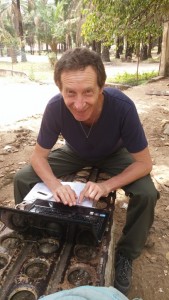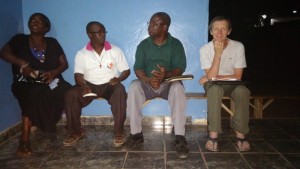 Two weeks ago Sierra Leone began the rainy season, even though still not with the intensity of July and August when it has monsoons. The present season acts to make the terrain soft and allows the planting of rice which is the basic food of local nutrition.
Two weeks ago Sierra Leone began the rainy season, even though still not with the intensity of July and August when it has monsoons. The present season acts to make the terrain soft and allows the planting of rice which is the basic food of local nutrition.
On the front of Ebola, the first lukewarm smiles which marked the drawing near of the end of the epidemic have in recent days given way to legitimate worry. Indeed, after in various districts the number of new cases fell to zero, and after at a national level no new cases were registered for about ten days, in recent days new cases of infection have forced us to be in a state of alert. A last gasp or a return to the epidemic? This cannot be excluded and we have to be on our guard again and raise the level of attention. This has to be done before the matter is closed!
Meanwhile the meetings with the four hundred families selected for the project involving emotional and humanitarian support have continued at an intense rhythm. The heads of the families, who themselves often survived the virus, take part in these groups. Always a great deal of suffering emerges; so many stories marked by sadness and trial. Like that of Kamara Sheka, a boy of sixteen who has lost twenty-three of his family relatives because of Ebola: an unspeakable sadness is impressed on his face and an incapacity to come out of himself to find comfort! Or like that of a mother, Thulla Adamsay, all of whose children have been killed by the epidemic! These stories could make up a book on their own and would add a human dimension of the aridity of the numbers – which are already dramatic – of this epidemic. The rains are a symbol of the many tears of recent days, often decorous tears but also an unstoppable and inconsolable weeping on many other occasions. And, like the rains, these tears, as well, allow hearts not to grow arid, not to become hard but to become transformed into fertile terrain that is capable of new reasons for life and hope.
In this land suffering is a natural travelling companion! Here suffering is expressed without embarrassment because it is life itself: it is not a mystery that should be concealed or an approach to be avoided because it is ‘politically incorrect’. Suffering and death are the same faces of joy and life and not their opposite. The former are in the latter in a form of continuity and not opposition. Life flows in an unstoppable flow of births and return to the ground, where death is a natural even that has to take place and touches everyone.
 This flow of life and death is well described in love for children, the sign of a life that enters the world and is very often the symbol of a frailty that is difficult to protect (the number of deaths of children under the age of five – independently of Ebola – is one of the highest in the world). These children belong to a family unit before they belong to their parents. Ebola has produced very many orphans but in fact it has not left any children in the street, and this to the extent that some people call into question the efficacy of the opening of orphanages (even when they are based on the model of small families) by foreign non-governmental organisations. Specifically because they belong to family units, there will always somebody to take care of orphans. This is the most moving aspect of this epidemic of Ebola. Aunts and uncles and distant relatives who come for nephews and nieces who have been left on their own; mothers who look after the children of sisters and brothers who have died because of Ebola, with a naturalness that goes beyond the logic of numbers (the increase in the mouths that have to be filled!); family units that have expand enormously with throngs of children. This is a sign of the resilience of these people, of their ability to go on living, even amidst tragedies and failure.
This flow of life and death is well described in love for children, the sign of a life that enters the world and is very often the symbol of a frailty that is difficult to protect (the number of deaths of children under the age of five – independently of Ebola – is one of the highest in the world). These children belong to a family unit before they belong to their parents. Ebola has produced very many orphans but in fact it has not left any children in the street, and this to the extent that some people call into question the efficacy of the opening of orphanages (even when they are based on the model of small families) by foreign non-governmental organisations. Specifically because they belong to family units, there will always somebody to take care of orphans. This is the most moving aspect of this epidemic of Ebola. Aunts and uncles and distant relatives who come for nephews and nieces who have been left on their own; mothers who look after the children of sisters and brothers who have died because of Ebola, with a naturalness that goes beyond the logic of numbers (the increase in the mouths that have to be filled!); family units that have expand enormously with throngs of children. This is a sign of the resilience of these people, of their ability to go on living, even amidst tragedies and failure.
Fr. Luca Perletti














Camillians on Facebook
Camillians on Twitter
Camillians on Instagram